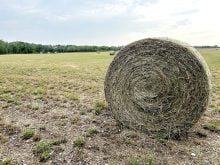Millions of tree seedlings at the AAFC Indian Head Agroforestry Centre are likely to remain in the ground this fall after all proposals to ensure continuity of operations at the shelterbelt nursery were rejected by the federal government.
Norm Hall, president of the Agricultural Producers Association of Saskatchewan, who also serves as the spokesman for the Western Canada Tree Nursery Coalition, said Agriculture Minister Gerry Ritz rejected the coalition’s business plan submitted in August because it called for $1.6 million in bridge funding.
“That’s what we were pushing for: Get the place leased, get the order forms out, get the harvest done, and just continue the program,” said Hall, adding that the funds requested amounted to half a year’s operating costs.
Read Also

Alberta farmer invited to World Economic Forum
Southern Albertan farmer’s regenerative agricultural practices featured on panels at Davos where nations come together in partnership.
“He said, ‘Come back to us when you are serious,’” said Hall.
Hall said Ritz broke his pledge earlier this year that he would ensure that the 112-year-old agroforestry centre continues to supply trees on a cost-recovery basis to landowners in Western Canada after the federal government divestiture.
Lorne Scott, the reeve of the RM of Indian Head, which is also a member of the coalition, fears closing the nursery is a foregone conclusion. He accused Ritz of sabotaging efforts to save the shelterbelt nursery and then laying the blame for its failure on the RM.
“Ritz has been telling the media that the RM of Indian Head is running the centre,” said Scott. “But no, the RM is not looking after the nursery.”
Scott added that the RM isn’t in a position to fund its continued operations, nor has it been authorized to take it over.
“Barring a miracle, I can’t see the facility surviving. It appears that it was designed to fail and shut down,” said Scott.
Shipped out
Scott noted that specially designed equipment is being shipped off to other AAFC sites across the country, tree order forms were removed from the agroforestry centre’s website earlier this fall, virtually all the employees have been laid off, and no one answers the phones.
The research aspect of the operation, which Ritz had originally promised would be preserved, may also be threatened.
“The guys in research are up in the air. They are not sure where they are going to be in six to 18 months,” said Hall.
Rodney Sidloski, CEO of Weyburn-based non-governmental aid organization HELP International, was one of 10 bidders reportedly vying to take over the shelterbelt nursery. Its proposal was rejected, even though Sidloski believes that HELP was the only one with actual reforestation experience.
He said that the delayed harvest won’t hurt the trees, but not having inventory ready for next year’s planting season might cripple efforts to keep the centre afloat.
“We don’t understand why the federal government isn’t allowing us as a public service organization to take a lease of the centre, harvest the trees, and take care of things, including a spring sale,” said Sidloski.
Volunteers ready
As for the harvest, Sidloski claims to have a team of volunteers ready to get to work within 48 hours.
“We’re ready to move in and harvest even today, but the longer we wait, the tougher the logistics will be to get the trees out of the ground,” he said.
HELP International, which operates its own 300,000-tree nursery on an eight-acre site, is dedicated to producing “two-penny trees” to “save the world” by controlling erosion, creating wildlife habitat and remediating polluted sites.
With research and aid projects operating both in Canada and Kenya, it has worked with dozens of landowners and planted hundreds of thousands of trees on farmland edges along the Souris River in a privately funded project since 2000, and has developed a low-cost system for propagating cuttings in styrofoam containers on farm dugouts.
With no forms available for ordering trees, and the RM not authorized to allow anyone else to do the harvest, sorting and storage of this year’s crop, Sidloski also said that Ritz appears ready to abandon the entire operation.
“We’re already producing a fifth of their production. We would love to get hold of that centre,” said Sidloski. “It’s so undercapacity. In the mid-1980s, it was producing 12 million trees a year.”
As planned
An emailed statement from Ritz’s staff said that federal government involvement at AAFC Indian Head is ending Dec. 31 “as planned.”
After that, it continued, “AAFC will continue to perform minimal field maintenance” until the completion of the disposal process, which will be undertaken in an “efficient, equitable and transparent manner” to ensure “best value for the taxpayer.”
“The government has been clear that no funding will be provided to pay for any group to assume ownership over the tree farm,” it stated.














